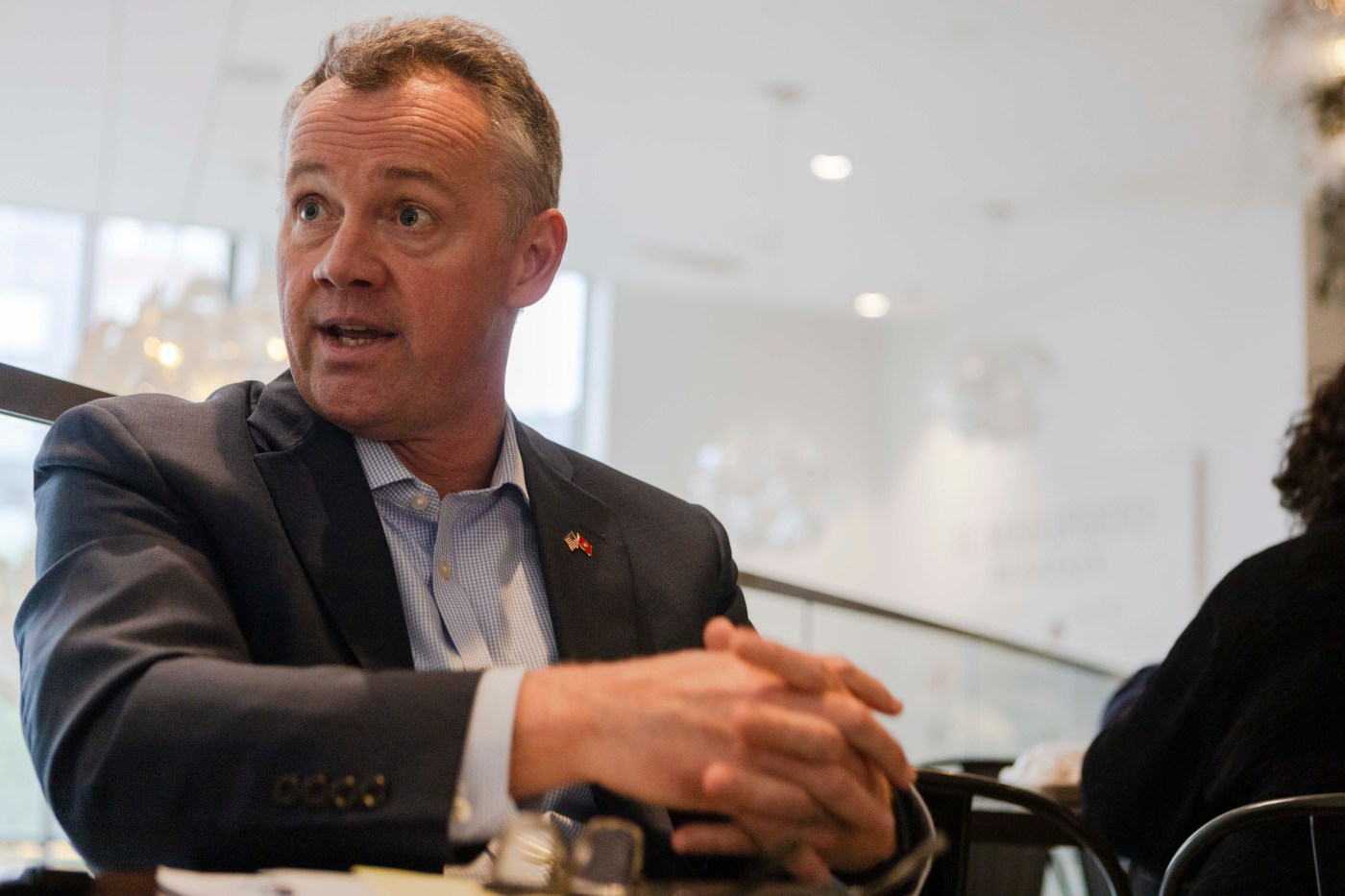
Potential GOP candidate for governor Brian Shortsleeve wants to repeal MBTA housing law
Brian Shortsleeve, a former MBTA executive and venture capitalist who is considering running for governor, said if elected, he would push state lawmakers to repeal a transit-oriented multi-family housing law that has generated controversy in cities and towns across the state.
The 52-year-old Barnstable Republican did not offer a timeline for when he plans to make a decision about running for governor — “stay tuned” — but instead outlined his thoughts on challenges officials across Massachusetts are facing, including the MBTA Communities Act.
Shortsleeve said the MBTA housing law, which requires some municipalities to zone at least one district near a transit hub for multi-family housing, is “a classic example of administrative overreach.”
“It’s a one-size-fits-all law. It doesn’t respect local differences in terms of infrastructure and everything else,” he said in an interview this past week. “We should be creating incentives for communities to build in areas we want to build. It should be the carrot. It should not be the stick.”
The statute became a flashpoint in Massachusetts after some cities and towns voted not to comply with its provisions. In one notable case, Attorney General Andrea Campbell took the Town of Milton to court over its decision to buck the law.
Gov. Maura Healey, who plans to run for reelection next year, has also withheld grant dollars from municipalities that are out of compliance, a move that is allowed under the law but has riled local leaders who argue the held-up cash is critical for projects or initiatives.
Shortsleeve said it is “critical” that Massachusetts build housing stock, but the MBTA Communities Act is “not the way to do it.”
“I would send it right back to the drawing board and start over,” he said. “Let’s get focused on using incentives to drive housing development. Let’s get focused on state land that’s vacant. Let’s get focused on transit-oriented development.”
Massachusetts Democratic Party Chair Steve Kerrigan slammed Shortsleeve.
“Brian Shortsleeve’s disastrous record as manager of the MBTA and chair of Trump loyalist Ron DeSantis’ campaign will be disqualifying to voters. He was a failure then, and he’d be a failure as governor,” Kerrigan said in a statement to the Herald.
Massachusetts has a ‘spending problem’
Shortsleeve, who is one of several Republicans in the mix ahead of the 2026 elections, said he believes Massachusetts is dealing with three major issues — an influx of migrants costing the state billions, unaffordability, and outmigration of residents.
He said the throughline between those problems is overspending by Democrats on Beacon Hill.
“We’ve got to get state spending under control. We’ve got to reduce taxes. We’ve got to reduce fees. We’ve got to get the private sector growing again. That’s going to take a new governor to do that,” he said.
The state’s annual budget has grown by nearly 30% since fiscal year 2022, when Massachusetts lawmakers approved a $47.9 billion spending document. Healey rolled out a $62 billion fiscal year 2026 budget in January that boosted spending by 7.4% over the previous fiscal year.
The House followed suit with a $61.4 billion spending plan for fiscal year 2026 that increases spending by 6.6%, and the Senate released a $61.3 billion budget that bumps spending by 6.3%.
Democratic lawmakers have said health and human service programs like MassHealth are a major driver of increased spending in the state budget.
Shortsleeve knocked Healey’s budget proposal for including a series of tax increases, like applying the sales tax to candy.
“She’s chomping at the bit to raise taxes,” he said. “When I look at our state, I don’t think we have a revenue problem. We have a spending problem.”
Shortsleeve voted for President Donald Trump
Shortlseeve has a long history of donating to Republican causes on the national and local level. He has also shuttled money to Democrats in Massachusetts, like Campbell and U.S. Reps. Jake Auchincloss and Seth Moulton.
He held a fundraiser in 2023 for Florida Gov. Ron DeSantis’ presidential bid that helped raise more than $500,000. He was also appointed to DeSantis’ national finance committee for his presidential campaign.
Shortsleeve did not directly say why he got involved with DeSantis’ unsuccessful presidential run when pressed by the Herald. He instead pointed to his time at Harvard University in the 1990s, when he said he and DeSantis advocated for the university to keep its ROTC program.
“I’m very proud to have been a member of the Advocates for Harvard ROTC, which is a group today that still advocates on behalf of ROTC. Gov. DeSantis is a member of that group, and it’s been a great effort,” Shortsleeve said.
Shortsleeve also praised DeSantis’ handling of Florida’s economy.
“If you look at the growth of that state, I think the economy has been terrific. The growth has been terrific,” he said. “But this election is not about Florida. It’s not about national issues. It’s about Massachusetts. It’s about how Massachusetts is going to start growing again.”
Asked if he voted for President Donald Trump, Shortsleeve said he backed the Republican ticket.
“I vote number one as a Marine, number two as a businessman. That means what I vote for is I vote to secure the border. I vote to reduce taxes. I vote to deregulate the economy so small businesses can grow, and I vote to eliminate waste and abuse in government. So I voted the ticket,” he said. “I supported the ticket.”
MBTA was a ‘target-rich environment’ for saving money
Shortsleeve served as chief administrator of the MBTA from July 2015 to July 2017 and was a member of the former Fiscal Management and Control Board from July 2017 to July 2020.
Shortsleeve said Baker called him after the MBTA collapsed in 2015 under relentless snowstorms to help manage the agency’s financial health.
The MBTA, according to Shortlseeve, had a $335 million forecasted deficit when he walked into the transit agency.
“We had a warehouse operation that took six days to move a bus … from Everett to Lynn. Amazon.com can do that in a day. That was driving some of the highest bus maintenance costs in the country. We had individuals claiming more overtime than there are literally waking hours in the day,” he said.
Shortsleeve also took credit for advancing the Green Line Extension project after the “feds had killed it” and officials had run over budget. He also pointed to his work expanding a contract with a Chinese-owned company to deliver new Orange and Red Line cars.
“We stopped that project. We rebid it, and two and a half years later, it was completed on time and under budget. The Green Line Extension today moves people from Downtown Crossing up to Tufts,” he said.
The $2.3 billion project has faced myriad issues, including narrow and defective tracks that MBTA officials knew about as far back as April 2021. The deal with Chinese manufacturer CRRC for new train cars has faced multiple delays and is now worth more than $1 billion.
But Shortsleeve said he is “very proud of what we accomplished” at the MBTA.
“We brought unparalleled transparency to the organization. We got costs under control. We balanced the budget. We tripled capital spending,” he said. “I think today the T’s gotta refocus on getting spending under control. There is no amount of revenue that will ever fill the hole if you’re growing your operating expenses at $200 million a year.”


